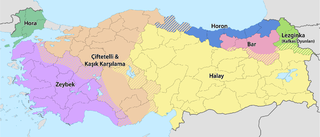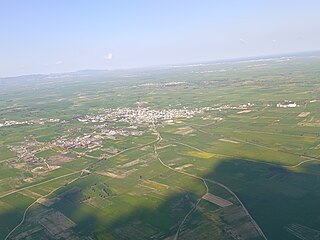This article needs additional citations for verification .(August 2021) |
Turkish Cypriot folk dances are dances that have been passed down through Turkish Cypriot culture.
This article needs additional citations for verification .(August 2021) |
Turkish Cypriot folk dances are dances that have been passed down through Turkish Cypriot culture.
Northern Cyprus became a member of Federation of International Dance Festivals (FIDAF) in 2014. [1]
Zeibekiko: Zeibekiko or Zeybekiko (Greek : Ζεϊμπέκικο) is a Turkic folk dance with a rhythmic pattern of 9
4 [2] or 11
8.

Cyprus, officially the Republic of Cyprus, is an island country in the eastern Mediterranean Sea. It is geographically a part of West Asia, but its cultural ties and geopolitics are overwhelmingly Southeast European. Cyprus is the third largest and third-most populous island in the Mediterranean. It is east of Greece, north of Egypt, south of Turkey, and west of Lebanon and Syria. Its capital and largest city is Nicosia. Cyprus also shares land borders with Akrotiri and Dhekelia, a dependent territory of the United Kingdom. The northeast portion of the island is de facto governed by the self-declared Turkish Republic of Northern Cyprus.

Limassol, also known as Lemesos, is a city on the southern coast of Cyprus and capital of the Limassol district. Limassol is the second-largest urban area in Cyprus after Nicosia, with an urban population of 195,139 and a district population of 262,238. The Limassol municipality is the most populated in Cyprus, with a population of 108,105, followed by Strovolos in Nicosia.

Northern Cyprus, officially the Turkish Republic of Northern Cyprus (TRNC), is a de facto state that comprises the northeastern portion of the island of Cyprus. It is recognised only by Turkey, and its territory is considered by all other states to be part of the Republic of Cyprus.

The music of Cyprus includes a variety of traditional, Western classical and Western popular genres. Cypriot traditional music is similar to the traditional music of Greece, it is most similar to Nisiotika the songs and dances of the Aegean islands, and includes dances like sousta, syrtos, ballos, tatsia, antikristos, arabiye, karotseris, sinalik, çifteli, zeimbekiko and the mandra dance.
Zeibekiko is a Greek folk dance, similar to Turkish Zeybek dance.

North Nicosia or Northern Nicosia is the capital and largest city of the de facto state of Northern Cyprus. It is the northern part of the divided city of Nicosia, and is governed by the Nicosia Turkish Municipality. As of 2011, North Nicosia had a population of 61,378 and a metropolitan area with a population of 82,539.

Karsilamas is a folk dance spread all over Northwest Turkey and carried to Greece by Anatolian Greek immigrants. The term "karşılama" means "encounter, welcoming, greeting" in Turkish. The dance is popular in Northwestern areas of Turkey, especially on wedding parties and festivals.
Greek traditional music includes a variety of Greek styles played by ethnic Greeks in Greece, Cyprus, Australia, the United States and other parts of Europe. Apart from the common music found generally in Greece, each region of Greece contains a distinct type of folk music that originated from the region due to their history, traditions and cultural influences.

Turkish folk dances are the folk dances of Turkey. Facing three seas, straddling important trade routes, Turkey has a complex, sophisticated culture, reflected in the variety of its dances. The dominant dance forms are types of line dance. There are many different types of folk dances performed in various ways in Turkey. Zeybek, Teke Zortlatması in Aegean region, Bar in Erzurum province, Halay in the central, southern, eastern, and southeastern parts of the country, Hora in Thrace, Horon in the eastern Black Sea region, Spoon dances in and around Konya, and Lezginka in Kars and Ardahan are some of the best known examples of these.

The zeybek is a form of Turkish folk dance originating from Yörüks particular to Western, Central and Southern Anatolia in Turkey. It is named after the Zeybeks.

Trikomo is a town in North-Eastern Mesaoria in Cyprus. It is under the de facto control of Northern Cyprus and is the administrative center of the İskele District of Northern Cyprus. It gained municipality status in 1998.
Greek New Zealanders are New Zealand citizens and residents who are of full or partial Greek ancestry; either those who immigrated to or are born in New Zealand. Large concentrations of the community are to be found in Wellington, and to a lesser extent Christchurch and Auckland. Smaller communities of Greeks reside in Palmerston North, Wanganui, Dunedin, Hamilton, Nelson and Napier. Many Greek New Zealanders maintain their Greek identity through the observation of Greek customs and traditions, and their adherence to their Greek Orthodox (Christian) faith, whilst also assimilating into New Zealand society.

Gönyeli is a town in Cyprus, near the capital city Nicosia. It is de facto under the control of Northern Cyprus. Over the years the town has merged with North Nicosia, making it connurbated with the city. Its population as of 2011 is 11,671.

Vatili is a village in the Famagusta District of Cyprus, near Lysi. De facto, it is under the control of Northern Cyprus.

Tsifteteli or Çiftetelli, is a rhythm and belly dance of Anatolia and the Balkans. In Turkish the word means "double stringed", taken from the violin playing style that is practiced in this kind of music. There are suggestions that the dance existed in ancient Greece, known as the Aristophanic dance Cordax, even though such claims have yet to be confirmed. Furthermore, it is historically never spotted in Greece before the Greek-Turkish population exchange of 1923, and no dance in native Greek tradition shows similarities with the specific dance. Despite this, it has established itself as the most popular and most common Greek dance together with Zeibekiko. Nowadays it is found not only in Greece and Turkey, but also in the entirety of the Southeastern Mediterranean region.
Music of Thessaly is the music of the geographic and historical region of Thessaly in Greece. Folk dances from Thessaly are slow and stately, however the music accompanying the Syrtos dance, is typically livelier and more energetic than it is in other parts of Greece and include: Kalamatianos, Thessalikos, Dionysiakos, koftos, Sirtaki, Kalamatiano, Syrtos, kleistos, kangeli, gaitanaki, tsamikos, Pilioritikos, Svarniara, Sta tria, Karagouna, Kleistos, zeibekiko, Rougatsiarikos, Tsamiko of Deskati, antikrystos and galanogalani.
There are 29 sports federations in Northern Cyprus and 13,838 people registered in them as of 2008. Taekwondo-karate-aikido-kurash is the most popular sport with 6054 athletes. It is followed by association football, shooting and hunting.

Belly dance is a Middle Eastern dance that originated in Egypt, which features movements of the hips and torso. A Western-coined exonym, it is also referred to as Middle Eastern dance or Arabic dance. It has evolved to take many different forms depending on the country and region, both in costume and dance style; with the styles and costumes of Egypt being the most recognized worldwide due to Egyptian cinema. Belly dancing in its various forms and styles is popular across the globe where it is taught by a multitude of schools of dance.
The culture of Northern Cyprus is the pattern of human activity and symbolism associated with Northern Cyprus and Turkish Cypriots. It features significant elements influenced by or developed upon the culture of Turkey, but combines these elements with a unique Cypriot approach and local traditions, as well as several other influences, such as the British and contemporary western cultures.

Göçmenköy is a quarter of North Nicosia in Northern Cyprus. As of 2011, it had a population of 3,003. It was founded in 1966 as a settlement for the Turkish Cypriots displaced by the intercommunal violence. The formerly rural area became heavily urbanized in the 1960s and 70s. Göçmenköy became a vibrant part of North Nicosia, and is home to the Atatürk Sports Complex, which is home to the Nicosia Atatürk Stadium, the largest stadium in Northern Cyprus. It co-hosts an annual international festival.